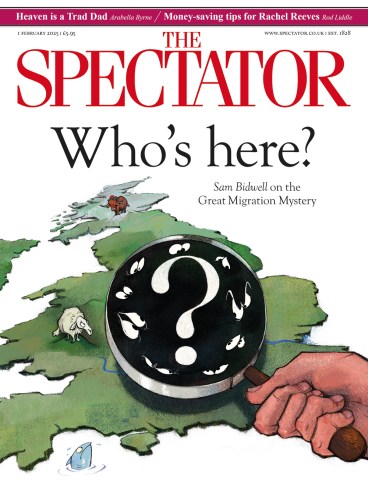
Netflix is the television equivalent of pasta and ready-made pesto: a slightly desperate but acceptable enough stand-by when you’ve got home late, you haven’t time to prepare anything more nutritious and at least it fills the gap without too much pain or fuss.
It is an adamantine rule of television that foreign-language dramas are always superior
La Palma is classic Netflix. You wouldn’t necessarily rave about it to your friends. But if, as I do, you have one of those wives who gets really pissed off if there’s not a programme ready and waiting to be viewed while supper’s still hot and, in a panic, you click on La Palma, you won’t feel at the end of the final episode like your time has been totally wasted.
This is due, in part, to the location. On glimpsing those dramatic volcanic peaks, lush, prehistoric valleys and crystal clear waters complete with pretty orange fish, I had to double check that La Palma really was in the Canary Islands. Not unlike La Gomera (also in the Canaries), it looks more like one of those trip-of-a-lifetime destinations in the South Pacific that you can’t afford than something that’s just a short hop away from Gatwick. I hope the filmmakers got a good discount from the La Palma tourist board.
The only reason they might not have done is that the drama focuses on La Palma’s main drawback: it’s supposedly going to be the starting point for the world’s worst tsunami. This theory is based on modelling (science speak for ‘Ain’t never going to happen, ever’; see also: man-made global warming, foot and mouth, etc.) by a pair of researchers in 2001, who calculated what might happen if a fracture in the Cumbre Vieja volcano developed into a landslide. Up to 120 cubic miles of rock might collapse into the sea, causing a 2,000ft wave to take out Tenerife and Gran Canaria, and still reach heights of more than 60ft by the time it hits the Americas.
Obviously, the drama does not take this hypothesis with a huge pinch of salt because the finale in episode four would be a bit anticlimactic. I don’t think I’m spoiling anything when I say: yes, the landslide does happen; yes, gazillions of tourists (it’s Christmas) fail to escape because it’s all so sudden; and yes, there really is an exciting – if not wholly plausible – race against time involving a rubber speedboat and a pursuing giant wave.
Ah, but how, you might wonder, could a speedboat ever hope to outrun a wave of such enduring power it’s still lethal by the time it reaches America? That would be telling, but it’s one of several ingenious little quirks in the plot which pitch it at a level quite a bit higher than your bog-standard made-for-television disaster movie.
For this I think we can probably thank the fact that this is not a US or UK Netflix production, but a Norwegian one. It is an adamantine rule of television that foreign-language dramas are always superior to English-speaking ones because they are less right-on, more original and strive harder to please because they’re painfully aware of the average viewer’s reluctance to watch anything with subtitles.
That’s why, even though our heroes, a family of Norwegians, are a bit irritating and have been shoehorned into Netflix’s wearisome, predictable diversity boxes (one child has a disability; the other is a lesbian), they’re likeable and interesting and well-written enough for you to genuinely care whether or not they survive the big wave.
I could tell you more but I think it would be more useful if, by way of contrast, I warned you off the latest Harlan Coben thriller Missing You, also on Netflix. You might be tempted because it stars the funny, simpatico Rosalind Eleazar (Louisa from Slow Horses). Also, it does involve a deliciously macabre League of Gentlemen subplot (starring appropriately enough, Tubbs, a.k.a. Steve Pemberton). But what lets it down is the ridiculously convoluted and anti-climatic main plot involving Lenny Henry.
It’s not Henry’s fault. Well, not totally. Mainly it’s the problem you always get with anything of Coben’s. Some 14 of his books have been earmarked for Netflix adaptation in a multi-million-dollar five-year deal, but I doubt I’ll watch any more because they all have the same flaw: labyrinthine plotting with endless twists – usually, tiresomely involving something mysterious that happened in the past, but we’re not allowed to discover what till the last minute – with plausibility and character development taking a poor second place. I’m almost tempted to tell you the ending just to spare you the bother.









Comments